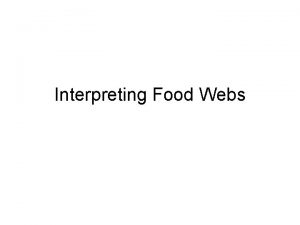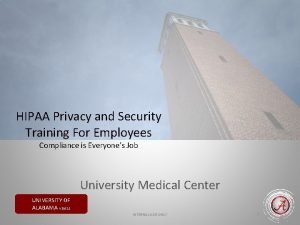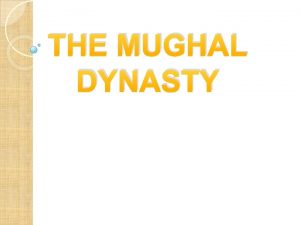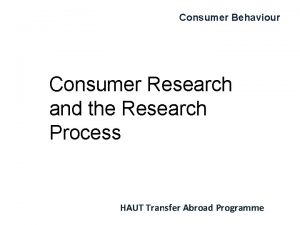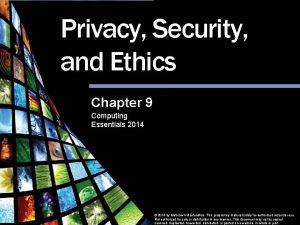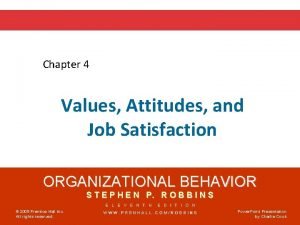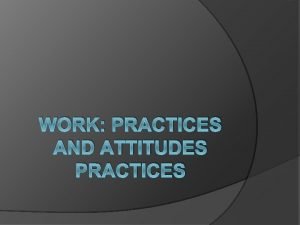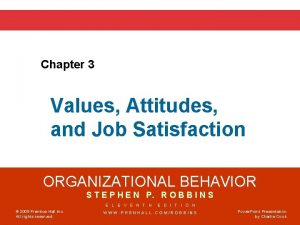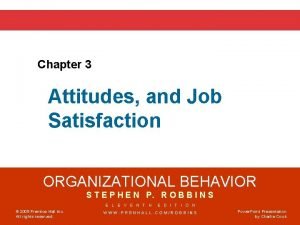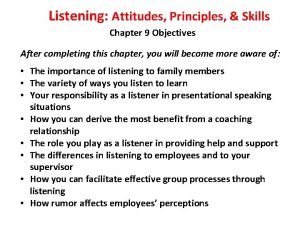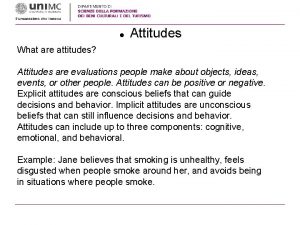Consumer Survey of Attitudes Toward the Privacy and




























![Question 19 – Original Wording [ASKED ONLY IF RESPONDENT REPORTS NEVER ACCESSING THE INTERNET] Question 19 – Original Wording [ASKED ONLY IF RESPONDENT REPORTS NEVER ACCESSING THE INTERNET]](https://slidetodoc.com/presentation_image_h2/54676387d71e35df148281208c882ab1/image-29.jpg)


































- Slides: 63

Consumer Survey of Attitudes Toward the Privacy and Security Aspects of Electronic Health Records and Electronic Health Information Exchange Office of the National Coordinator for Health Information Technology (ONC) Findings and Recommendations from Cognitive Testing Interviews Lisa Lee, Sr. Survey Methodologist Laurie Imhof, Sr. Survey Director February 29, 2012

Purpose • Test draft English and Spanish versions of questionnaires • Assess respondents’ comprehension of the questionnaire items, including question intent and the meaning of specific words and phrases • Examine respondents’ retrieval of relevant information from memory; decision processes involved with answering a question; and appropriateness of response categories • Provide information on average administration time of questionnaire DRAFT: Findings and Recommendations from Cognitive Testing Interviews 2

Methodology • Participants were recruited from Chicago area by focus group facility • Match socio-demographic characteristics of target population (oversample African Americans and Hispanics/Latinos) • Total of 25 completed interviews (15 English; 10 Spanish) • Interviews were conducted at NORC offices by survey methodologists and project staff • Interviews were conducted January 12 – February 9, 2012 • Spanish interviews were conducted by native Spanish-speaking NORC survey methodologist DRAFT: Findings and Recommendations from Cognitive Testing Interviews 3

Methodology (continued) • Administered verbal consent form • Administered draft survey questionnaire over the telephone from separate conference room • Administered cognitive interview protocol in-person • Respondents received $40 incentive for their participation DRAFT: Findings and Recommendations from Cognitive Testing Interviews 4

Respondent Demographics • Gender • Male: • Female: • Race/Ethnicity 11 14 • Age • • • 18 -25: 26 -35: 36 -45: 46 -55: 56+: • • White/Caucasian: Black/African American: Asian: Hispanic/Latino: 7 6 2 10 – All Spanish interviews 5 4 5 7 4 Note: Hispanic/Latino respondents were included in Spanish interview group only DRAFT: Findings and Recommendations from Cognitive Testing Interviews 5

Questionnaire Timings • All interviews (25) • Average administration time: 19 min • English interviews (15) • Average administration time: 19 min • Spanish interviews (10) • Average administration time: 20 min – Note: Timings do not include introductory script or administration of verbal consent, which required an additional 3 -6 minutes DRAFT: Findings and Recommendations from Cognitive Testing Interviews 6

Questionnaire Timings – Effect on Response Rates and Costs • Current questionnaire is 5 -10 minutes too long • 5 -minute increase in administration time = 3% drop in the CASRO response rate and 13% increase in interviewer hours • 10 -minute increase in administration time = 5% drop in the CASRO response rate and 33% increase in interviewer hours - CASRO (Council of American Survey Research Organizations) response rate = Working residential number resolution rate * Household screening completion rate * Survey interview completion rate. - Based on NORC findings from the 2011 National Immunization Survey, one of the largest national RDD landline and cell telephone surveys. Results are from questionnaire re-design experiments and the inclusion/exclusion of 5 -minute modules. DRAFT: Findings and Recommendations from Cognitive Testing Interviews 7

Questionnaire Timings - Goals • Goal is 10 -15 minute questionnaire • Average time for introductory script, selection of HH respondent and consent = 5 minutes • Average time for questionnaire = 10 -15 minutes • Total survey administration time = 15 -20 minutes • Goal is to cut 5 to 10 minutes from questionnaire • Average administration time is 2 -3 questions per minute • 5 minutes = approx. 10 -15 items • 10 minutes = approx. 20 -30 items • Goal = cut 20 items DRAFT: Findings and Recommendations from Cognitive Testing Interviews 8

Cognitive Interviews Questionnaire Finding and Recommendations

Question 1 – Original Wording First, let’s talk about your visits to a doctor or other health care provider. I am interested in the visits you made to a doctor or other health care provider within the last 12 months. I want to know both the number of different doctors or other health care providers you visited and then the total number of visits. First, how many different doctors and health care providers have you visited in the last 12 months? Please include primary care physicians, specialists, mental health professionals, physician assistants, nurses, clinics, and hospitals. • • • 1 to 2 3 to 5 6 to 9 10 or more None DRAFT: Findings and Recommendations from Cognitive Testing Interviews 10

Question 1 – Findings • Question is lengthy due to the preamble. • Suggest deleting preamble (paragraph beginning with “I am interested in the visits…”) • Phrase “doctor or other health care provider” is awkward and lengthy to read over the telephone. • Suggest shortening to “health care provider” throughout questionnaire and providing definition before first question. DRAFT: Findings and Recommendations from Cognitive Testing Interviews 11

Question 1 – Recommendations Reword question to: First, let’s talk about your visits to health care providers. By health care providers, we mean primary care physicians, specialists, mental health professionals, physician assistants, nurses, clinics, and hospitals. How many different health care providers have you visited in the last 12 months? • • • 1 to 2 3 to 5 6 to 9 10 or more None DRAFT: Findings and Recommendations from Cognitive Testing Interviews 12

Question 3 – Original Wording Are you being treated for any chronic disease or medical condition such as, but not limited to, high blood pressure, diabetes, heart or lung disease, a mental health problem or arthritis? • YES • NO DRAFT: Findings and Recommendations from Cognitive Testing Interviews 13

Question 3 – Findings • Inclusion of the phrase “but not limited to” is not necessary. “Such as” conveys the point that the conditions listed are examples. • Suggest deleting “but not limited to”. DRAFT: Findings and Recommendations from Cognitive Testing Interviews 14

Question 3 – Recommendations Reword question to: Are you being treated for any chronic disease or medical condition such as high blood pressure, diabetes, heart or lung disease, a mental health problem or arthritis? • YES • NO DRAFT: Findings and Recommendations from Cognitive Testing Interviews 15

Question 6 – Original Wording How often do you receive a paper or electronic summary of your visit with a doctor or other health care provider? • • • Never Rarely Sometimes Most times Every time DRAFT: Findings and Recommendations from Cognitive Testing Interviews 16

Question 6 – Findings • Some respondents indicated that they would include insurance and billing information as part of the visit summary, not just medical information. • Suggest clarifying the question to specifically exclude non-medical information. DRAFT: Findings and Recommendations from Cognitive Testing Interviews 17

Question 6 – Recommendations Reword question to: How often do you receive a paper or electronic medical summary of your visit with a doctor or other health care provider? • • • Never Rarely Sometimes Most times Every time DRAFT: Findings and Recommendations from Cognitive Testing Interviews 18

Question 7 – Original Wording How comfortable would you feel asking for a copy of your medical information from your doctor or other health care provider? • • • Very comfortable Somewhat comfortable Slightly uncomfortable Uncomfortable Very uncomfortable DRAFT: Findings and Recommendations from Cognitive Testing Interviews 19

Question 7 – Findings • Too many response categories. It is difficult to differentiate between “somewhat comfortable” and “slightly comfortable”. The scale should be revised to match other similar scales in the questionnaire. • Suggest reducing the number of response categories and matching wording to similar questions. • We need to clarify what “medical information” is being referenced in Q 7. Is it the same as the “summary of your visit” mentioned in Q 6? DRAFT: Findings and Recommendations from Cognitive Testing Interviews 20

Question 7 – Recommendations Reword question to: How comfortable would you feel asking for a copy of your medical information from your doctor or other health care provider? • • Very comfortable Somewhat comfortable Not very comfortable Not at all comfortable DRAFT: Findings and Recommendations from Cognitive Testing Interviews 21

Question 9 – Original Wording How difficult was it to receive the medical information you requested? If you did not receive the information, please let us know. • • • Not difficult at all A little difficult Somewhat difficult Very difficult I was not able to get the information I requested DRAFT: Findings and Recommendations from Cognitive Testing Interviews 22

Question 9 – Findings • The part of the question that reads, “If you did not receive the information…” does not need to be read. It can simply be included in the response options. • Suggest deleting “If you did not receive the information, please let us know. ” • Change the last response option to “Or did you not get the information you requested? ”, which will be read by the telephone interviewer as part of the response options. DRAFT: Findings and Recommendations from Cognitive Testing Interviews 23

Question 9 – Recommendations Reword question to: How difficult was it to receive the medical information you requested? • • • Not difficult at all A little difficult Somewhat difficult Very difficult Or did you not get the information you requested DRAFT: Findings and Recommendations from Cognitive Testing Interviews 24

Section iii (Caregiving) – Q 12 to Q 17 Are you currently caring for or making health care decisions for a family member? • YES • NO Overall, how satisfied are you with the quality of the health care they have received from their doctor and other health care provider(s)? • • Very satisfied Somewhat Satisfied Dissatisfied Very dissatisfied DRAFT: Findings and Recommendations from Cognitive Testing Interviews 25

Section iii (Caregiving) – Q 12 to Q 17, continued Within the past 12 months have you asked for copies of their medical information from their doctor or other health care provider? • YES • NO How difficult was it to receive the medical information you requested for your family member? If you didn’t receive the information, please let us know. • • • Not difficult at all A little difficult Somewhat difficult Very difficult I was not able to get the information I requested DRAFT: Findings and Recommendations from Cognitive Testing Interviews 26

Section iii (Caregiving) – Q 12 to Q 17, continued • What was the format of the copy of the medical information you received (paper or electronic)? • RECEIVED AN ELECTRONIC COPY • RECEIVED A PAPER COPY • RECEIVED BOTH • Have you accessed or used an electronic personal health record (PHR) on behalf of your family member? A PHR is an electronic application that allows you to access, enter, and manage medical information. • YES • NO DRAFT: Findings and Recommendations from Cognitive Testing Interviews 27

Section iii (Caregiving) – Findings/Recommendations • The caregiving questions will require some respondents to consider more than one family member or more than one doctor when formulating responses to the questions. • For the constructs being measured (e. g. , level of satisfaction with quality of care and difficulty of receiving medical information) the correct response may vary for each family member or provider. For example, the respondent may be very satisfied with the care one family member received and very dissatisfied with the care another family member received. The respondent will have to form an answer that summarizes these different responses. • These issues with the caregiving questions may increase burden on respondents and may make the responses to the questions difficult to interpret. • Clarify the intent of asking the caregiving questions. • Consider simplifying or deleting the caregiving questions. • Relatively few respondents indicated that they were currently caring for/making health care decisions for a family member. It is possible that some respondents were not including minor children in their household. It may be necessary to explicitly mention children in the question. DRAFT: Findings and Recommendations from Cognitive Testing Interviews 28
![Question 19 Original Wording ASKED ONLY IF RESPONDENT REPORTS NEVER ACCESSING THE INTERNET Question 19 – Original Wording [ASKED ONLY IF RESPONDENT REPORTS NEVER ACCESSING THE INTERNET]](https://slidetodoc.com/presentation_image_h2/54676387d71e35df148281208c882ab1/image-29.jpg)
Question 19 – Original Wording [ASKED ONLY IF RESPONDENT REPORTS NEVER ACCESSING THE INTERNET] Could you access the internet easily if you needed to? (for example, at work, school, someone else’s house, a community center or library, etc. ) • YES • NO DRAFT: Findings and Recommendations from Cognitive Testing Interviews 29

Question 19 – Findings • The current wording of the question does not capture the reasons why a respondent does not access the internet. For example, a respondent may have access to the internet but not want to use it. Somebody who does not use the internet may also not know how easily accessible it would be if they wanted to use it. • Suggest clarifying the intent of the question. DRAFT: Findings and Recommendations from Cognitive Testing Interviews 30

Question 19 – Recommendations Revise to clarify question intent: [ASKED ONLY IF RESPONDENT REPORTS NEVER ACCESSING THE INTERNET] Is that because you do not want to use the internet or because it is difficult for you to access it? • Do not want to use internet • Difficult to access internet DRAFT: Findings and Recommendations from Cognitive Testing Interviews 31

Question 21 – Original Wording Have you ever kept an electronic personal health record, or PHR, for yourself? A PHR is an electronic application that allows you to access, enter, and manage some of your medical information. • YES • NO DRAFT: Findings and Recommendations from Cognitive Testing Interviews 32

Question 21 – Findings • Respondents were generally unaware of PHRs. Some respondents thought having a PHR meant being able to look at your medical information or test results online. • Suggest including additional information (definition, example) of PHR. DRAFT: Findings and Recommendations from Cognitive Testing Interviews 33

Question 25 – Original Wording To the best of your knowledge, does your doctor or other health care provider: • Electronically send prescriptions or refill requests directly to your pharmacy? YES NO • IF NO: Should they be able to do this? YES NO • Electronically send your medical records to other providers that are caring for you? YES • NO IF NO: Should they be able to do this? YES NO • Electronically obtain your medical records from other providers? YES • NO IF NO: Should they be able to do this? YES NO DRAFT: Findings and Recommendations from Cognitive Testing Interviews 34

Question 25 – Findings • Some respondents answered these questions based on whether their providers had ever actually done each activity, not whether they had the capability. • Suggest clarifying the intent of the question (capability to perform activity, not whether the provider has ever performed each activity for the respondent). • Remove reference to “you” so that the questions pertain to the provider’s general capabilities, not what the provider has done for the respondent specifically • The follow-up questions for respondents who answer “no” for each activity interrupt the flow of the question and make it more difficult to understand the next question in the series without repeating the stem. Question 24 should adequately cover the issues regarding whether medical information should be shared or sent electronically. • Suggest deleting follow-up questions DRAFT: Findings and Recommendations from Cognitive Testing Interviews 35

Question 25 – Recommendations Revise wording to: To the best of your knowledge, can your health care provider: • Electronically send a patient’s prescriptions or refill requests directly to pharmacies? YES NO • Electronically send a patient’s medical records to other providers that are caring for them? YES NO • Electronically obtain a patient’s medical records from other providers? YES NO DRAFT: Findings and Recommendations from Cognitive Testing Interviews 36

Question 26 – Original Wording If your providers were able to share your medical information electronically, do you think it is very likely, somewhat likely, not very likely or not at all likely that each of the following is to occur? a. The quality of the care that you receive would be improved. b. The safety of the care that you receive would be improved c. You would have fewer repeated tests because doctors and other health care providers and hospitals could access your recent test results. d. Your doctors and other health care providers would do a better job coordinating your care with other doctors and health care providers. • • Very likely Somewhat likely Not very likely Not at all likely DRAFT: Findings and Recommendations from Cognitive Testing Interviews 37

Question 26 – Findings and Recommendations • These questions are very hypothetical and are fairly lengthy for a telephone interview. Items “c” and “d” in particular are complex. If the intent of the questions are to measure perceived benefits of health IT, other questions may already cover this. • Suggest deleting questions DRAFT: Findings and Recommendations from Cognitive Testing Interviews 38

Questions 27 and 28 – Original Wording Core Questions How confident are you that you have some say in who is allowed to collect, use and share your medical information? Having a say in who can collect, use and share your medical information has to do with the privacy of your records. How confident are you that safeguards (including the use of technology) are in place to protect your medical records from being seen by people who aren’t permitted to see them? Having safeguards (including the use of technology) in place has to do with the security of your medical records. • Very confident • Somewhat confident • Not confident DRAFT: Findings and Recommendations from Cognitive Testing Interviews 39

Questions 27 and 28 – Findings Core Questions • The question is presented first, followed by the definitions for privacy and security. Because the question has already been asked, respondents sometimes attempt to answer before the italicized text is read. • The questions are a bit long. • Italicizing part of the question text may make it unclear to interviewers whether the text should be read to all respondents or only read for clarification as needed. • Suggest removing italicization from the question text. • The parentheses in the question on safeguards may suggest to interviewers that the parenthetical text should only be presented as needed for clarification. • Suggest removing parentheses from the question text and replacing with commas. DRAFT: Findings and Recommendations from Cognitive Testing Interviews 40

Question 29 – Original Wording If you have looked online at your medical information, like lab tests, how confident do you feel that your medical information was kept safe and private? • • • Very confident Somewhat confident Not very confident Not at all confident Not applicable/I have never looked online at my medical information DRAFT: Findings and Recommendations from Cognitive Testing Interviews 41

Question 29 – Findings • The question applies only to respondents who have looked at their medical information online. Suggest adding a skip instruction before Q 29 based on respondent answers to Q 20 to allow those respondents who have not viewed their medical information online to skip Q 29 • If Q 20 (Have you ever looked at any of your medical test results online) = YES, go to Q 30. • Rephrase “If you have looked online at your medical information, like lab tests” to apply to respondents who are known to have viewed medical information online. • Remove the last response option: Not applicable/I have never looked online at my medical information DRAFT: Findings and Recommendations from Cognitive Testing Interviews 42

Question 29 – Recommendations Revise wording to: How confident do you feel that your online medical information, like lab tests, was kept safe and private? • • Very confident Somewhat confident Not very confident Not at all confident DRAFT: Findings and Recommendations from Cognitive Testing Interviews 43

Questions 31 and 32 – Original Wording Core Questions If your medical information is sent by fax from one health care provider to another, how concerned are you that an unauthorized person would see it? If your medical information is sent electronically from one health care provider to another, how concerned are you that an unauthorized person would see it? (Electronically means from computer to computer, instead of by telephone, mail, or fax machine. ) • • • Very concerned Somewhat concerned Not concerned DRAFT: Findings and Recommendations from Cognitive Testing Interviews 44

Questions 31 and 32 – Findings Core Questions • Q 31 question is confusing because faxes can be electronic. The distinction between this question and Q 32, on sending medical information electronically, is unclear for those respondents who are aware that faxes can be sent electronically. • Clarify question intent. What is the distinction being made between faxed and electronic transmittal of medical information? • If the intent of the questions is to compare the security of paper records vs. electronic records, change Q 31 to refer to “paper” records or sending records “by mail. ” • Q 32 includes a definition for the term “electronically” in parentheses after the question is presented. The definition contrasts computers to telephone, mail and fax. However, Q 31 and Q 32 are contrasting fax and electronic/computer. Also, because the question has already been asked, respondents may attempt to answer before the definition of “electronically” is read. • Suggest clarifying the definition of “electronically” in Q 32 and including the definition within the question. DRAFT: Findings and Recommendations from Cognitive Testing Interviews 45

Question 33 – Original Wording If your health information were accessed by someone who did not have permission, how likely do you think it is that any of the following would happen? Respond with very likely, somewhat likely, not very likely or not at all likely. a. You would be discriminated against b. You would experience personal or professional embarrassment c. The information would be used to steal your identity d. The information would be used to commit fraud • • Very likely Somewhat likely Not very likely Not at all likely DRAFT: Findings and Recommendations from Cognitive Testing Interviews 46

Question 33 – Findings • The question is hypothetical for respondents who have not had their health information accessed by someone without permission. • Having health information accessed by “someone who does not have permission” is very general. Respondent answers to the question may vary greatly depending on how they interpret the phrase. The “someone” could be a personal acquaintance or a hacker, for example, and each of these persons would pose different risks to the respondent. • It is unclear what items “c” and “d” mean. Identity theft and fraud seem very similar. • Clarify intent of the question. • Make the question more specific. • Who is the “someone” that respondents should consider? • What scenario would result in discrimination or personal/professional embarrassment? • What is the distinction between stealing identity and fraud? • Questions 27 through 32 also capture concerns about negative consequences from unauthorized access to medical records. Consider deleting Q 33 if it cannot be clarified. DRAFT: Findings and Recommendations from Cognitive Testing Interviews 47

Question 34 – Original Wording I am going to read to you some safeguards that could be taken to protect your computerized medical record. If doctors and other health care providers followed these safeguards, on a scale of 1 to 5, how much safer do you think your medical information would be? With 5 being much safer, and 1 being not any safer. a. Train employees on privacy and security b. Notify you if your medical information falls into unauthorized hands c. Allow you to review who has accessed your medical information d. Allow you to make informed choices about how your medical information is collected and used e. Prosecute and penalize those who violate privacy and security laws DRAFT: Findings and Recommendations from Cognitive Testing Interviews 48

Question 34 – Findings • The scale used in this question is different from others used in the instrument. The question required repetition because respondents had difficulty with the scale. • Statements a through e are complex and difficult for some respondents to understand. • Discuss complex elements of the question. • Simplify the question by revising the scale and/or the statements. • Consider deleting Q 34 if it cannot be simplified. DRAFT: Findings and Recommendations from Cognitive Testing Interviews 49

Question 35 – Original Wording I’m going to read a list of some of the types of information that may be in your medical record. I’d like you to tell me if you prefer this information be kept separate from the rest of your medical record when it is being shared. a. The medications you’ve been prescribed Yes No b. Results of genetic tests Yes No c. Results of HIV tests Yes No d. Results of test for sexually transmitted diseases Yes No e. Mental health diagnoses and treatment Yes No DRAFT: Findings and Recommendations from Cognitive Testing Interviews 50

Question 35 – Findings • Since the question does not explain what the context is in which records are to be shared, it is hard to interpret respondent answers. The nature and scope of how the medical information is shared needs to be clarified. • Clarify the intent of the question or consider deleting it. DRAFT: Findings and Recommendations from Cognitive Testing Interviews 51

Question 36 – Original Wording For each of the following types of information, please indicate whether you would want to limit sharing to: a) only the provider treating you for that condition, b) specific providers of your choice, or c) all providers treating you? a. The medications you’ve been prescribed b. Results of genetic tests c. Results of HIV tests d. Results of test for sexually transmitted diseases e. Mental health diagnoses and treatment • • • Only the provider treating you Specific providers of your choice All providers treating you DRAFT: Findings and Recommendations from Cognitive Testing Interviews 52

Question 36 – Findings • Respondents had difficulty making the distinction between the different response options. They frequently forgot about the “for that condition” phrase. • There is also the potential that respondents will give inconsistent answers across Q 35 and Q 36. Respondents could say in Q 35, for example, that they would not want medications to be part of the record that is shared. They could then indicate in Q 36 that all providers treating you should have information on medications. • As with Q 35, the nature and scope of how medical information is being shared is not clear. • As it is currently worded, the question does not adequately get at the concept of differential consent. • Clarify the intent of the question or consider deleting the item. DRAFT: Findings and Recommendations from Cognitive Testing Interviews 53

Questions 37 and 38 – Original Wording Existing laws provide a reasonable level of protection for computerized medical records and medical information today. Doctors and other health care providers have measures in place that provide a reasonable level of protection for computerized medical records and medical information today. • • • Strongly agree Agree Disagree Strongly disagree Don’t know DRAFT: Findings and Recommendations from Cognitive Testing Interviews 54

Questions 37 and 38 – Findings • Respondents know very little about existing laws. Some mention the HIPAA law. Others say they have no particular law in mind when answering Q 37. • Respondents also know little about the security measures in place at their doctor’s office. • Although respondents had little difficulty answering the questions, it is important to note that their responses are not based on knowledge of laws or their doctor’s practices. DRAFT: Findings and Recommendations from Cognitive Testing Interviews 55

Question 39 – Original Wording Core Question Now how much do you agree with these statements about support for the use of computerized medical records? I want my doctors or other health care providers to use a computerized medical record to store and manage my health information despite any concerns I might have about privacy and security. • • Strongly agree Agree Disagree Strongly disagree DRAFT: Findings and Recommendations from Cognitive Testing Interviews 56

Question 39 – Findings Core Question • The Spanish language version of this question is very long and difficult for respondents to understand. • Consider simplifying the question. DRAFT: Findings and Recommendations from Cognitive Testing Interviews 57

Question 39 – Recommendations Core Question Revise wording to: Now how much do you agree with these statements about support for the use of computerized medical records? Even though there may be privacy and security issues, doctors should store and manage patient information electronically. • • Strongly agree Agree Disagree Strongly disagree DRAFT: Findings and Recommendations from Cognitive Testing Interviews 58

Question 40 – Original Wording Core Question Now how much do you agree with these statements about support for the use of computerized medical records? I want my doctors or other health care providers to use a computer to share my health information with other providers treating me despite any concerns I might have about privacy and security. • • Strongly agree Agree Disagree Strongly disagree DRAFT: Findings and Recommendations from Cognitive Testing Interviews 59

Question 40 – Findings Core Question • The Spanish language version of this question is very long and difficult for respondents to understand. • Consider simplifying the question. DRAFT: Findings and Recommendations from Cognitive Testing Interviews 60

Question 40 – Recommendations Core Question Revise wording to: Now how much do you agree with these statements about support for the use of computerized medical records? Even though there may be privacy and security issues, doctors should share patient health information with each other electronically. • • Strongly agree Agree Disagree Strongly disagree DRAFT: Findings and Recommendations from Cognitive Testing Interviews 61

Question 42 – Original Wording Do you live in an urban, rural or suburban area? • URBAN • RURAL • SUBURBAN DRAFT: Findings and Recommendations from Cognitive Testing Interviews 62

Question 42 – Findings and Recommendations • Whether the respondent lives in an urban, rural or suburban area can be determined from the ZIP code, which is collected in Q 41. One respondent had difficulty determining which response to pick. She lived in the city and did not know that the city would be considered an urban area. • Also, some respondents who live outside the city limits, in “inner ring” suburbs, live in environments that seem quite urban. • Recommend deleting question. DRAFT: Findings and Recommendations from Cognitive Testing Interviews 63
 Food energy diagram
Food energy diagram Cvs privacy awareness and hipaa training answers
Cvs privacy awareness and hipaa training answers How did mughal attitudes and policies toward
How did mughal attitudes and policies toward Cashless philippines
Cashless philippines British social attitudes survey
British social attitudes survey Characteristics of buyer behaviour
Characteristics of buyer behaviour Changes in an individual's behavior arising from experience
Changes in an individual's behavior arising from experience Primary consumer
Primary consumer Consumer diversity in consumer behaviour
Consumer diversity in consumer behaviour Consumer behaviour research process
Consumer behaviour research process Abcd of acls
Abcd of acls Care certificate privacy and dignity answers
Care certificate privacy and dignity answers Azure pci dss responsibility matrix
Azure pci dss responsibility matrix Ferpa law
Ferpa law Chapter 9 privacy security and ethics
Chapter 9 privacy security and ethics Chapter 9 privacy security and ethics
Chapter 9 privacy security and ethics Family educational rights and privacy act of 1974
Family educational rights and privacy act of 1974 Confidentiality and privacy controls
Confidentiality and privacy controls Chapter 9 privacy security and ethics
Chapter 9 privacy security and ethics Three primary privacy issues are accuracy property and
Three primary privacy issues are accuracy property and Hipaa privacy and security awareness training
Hipaa privacy and security awareness training Destructive event or prank a virus was created to deliver
Destructive event or prank a virus was created to deliver Unit 14 social psychology study guide answers
Unit 14 social psychology study guide answers Nz attitudes and values study
Nz attitudes and values study Personal attitudes and dispositions also shape behavior
Personal attitudes and dispositions also shape behavior Quality culture vs traditional culture
Quality culture vs traditional culture Attitudes and movements
Attitudes and movements The total knowledge shared attitudes and behaviors
The total knowledge shared attitudes and behaviors Positive employee attitudes and behaviors
Positive employee attitudes and behaviors Workplace emotions attitudes and stress
Workplace emotions attitudes and stress The globe framework for assessing cultures
The globe framework for assessing cultures Work practices and attitudes
Work practices and attitudes Training is the act of increasing the
Training is the act of increasing the Workplace emotions, attitudes, and stress
Workplace emotions, attitudes, and stress Values and attitudes in the workplace
Values and attitudes in the workplace Values attitudes and job satisfaction
Values attitudes and job satisfaction Avhf
Avhf Communication is the exchange of
Communication is the exchange of Compare and contrast the major job attitudes
Compare and contrast the major job attitudes Chapter 3 attitudes and job satisfaction
Chapter 3 attitudes and job satisfaction Attitudes and persuasive communications
Attitudes and persuasive communications Emotions and values
Emotions and values Managing employee attitudes and behaviors
Managing employee attitudes and behaviors Virtues and vices are attitudes. what are their objects?
Virtues and vices are attitudes. what are their objects? Hpliooshyp basic beliefs, concepts, and attitudes
Hpliooshyp basic beliefs, concepts, and attitudes Employee attitudes and employee performance
Employee attitudes and employee performance Objectives of listening
Objectives of listening Habits and attitudes
Habits and attitudes Workplace behaviors and attitudes
Workplace behaviors and attitudes Hình ảnh bộ gõ cơ thể búng tay
Hình ảnh bộ gõ cơ thể búng tay Frameset trong html5
Frameset trong html5 Bổ thể
Bổ thể Tỉ lệ cơ thể trẻ em
Tỉ lệ cơ thể trẻ em Gấu đi như thế nào
Gấu đi như thế nào Tư thế worm breton là gì
Tư thế worm breton là gì Hát lên người ơi
Hát lên người ơi Các môn thể thao bắt đầu bằng tiếng nhảy
Các môn thể thao bắt đầu bằng tiếng nhảy Thế nào là hệ số cao nhất
Thế nào là hệ số cao nhất Các châu lục và đại dương trên thế giới
Các châu lục và đại dương trên thế giới Công thức tiính động năng
Công thức tiính động năng Trời xanh đây là của chúng ta thể thơ
Trời xanh đây là của chúng ta thể thơ Mật thư tọa độ 5x5
Mật thư tọa độ 5x5 Phép trừ bù
Phép trừ bù Phản ứng thế ankan
Phản ứng thế ankan
